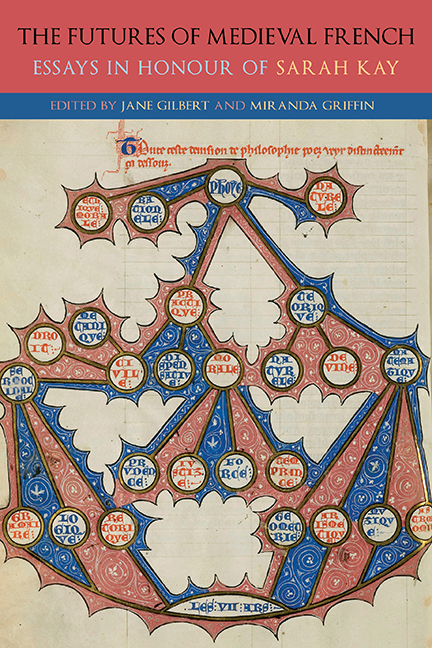Book contents
- Frontmatter
- Dedication
- Contents
- List of Illustrations
- List of Contributors
- List of Abbreviations
- Introduction
- Part I Subjectivity in Troubadour Poetry
- Part II The ‘Chansons de geste’ in the Age of Romance: Political Fictions
- Part III Courtly Contradictions: The Emergence of the Literary Object in the Twelfth Century
- Part IV The Place of Thought: The Complexity of One in French Didactic Literature
- Part V Parrots and Nightingales: Troubadour Quotations and the Development of European Poetry
- Part VI Animal Skins and the Reading Self in Medieval Latin and French Bestiaries
- Afterword
- General Bibliography
- List of Manuscripts
- Bibliography of Work by Sarah Kay
- Index
- Gallica
Logic, Meaning, and Imagination
Published online by Cambridge University Press: 27 May 2021
- Frontmatter
- Dedication
- Contents
- List of Illustrations
- List of Contributors
- List of Abbreviations
- Introduction
- Part I Subjectivity in Troubadour Poetry
- Part II The ‘Chansons de geste’ in the Age of Romance: Political Fictions
- Part III Courtly Contradictions: The Emergence of the Literary Object in the Twelfth Century
- Part IV The Place of Thought: The Complexity of One in French Didactic Literature
- Part V Parrots and Nightingales: Troubadour Quotations and the Development of European Poetry
- Part VI Animal Skins and the Reading Self in Medieval Latin and French Bestiaries
- Afterword
- General Bibliography
- List of Manuscripts
- Bibliography of Work by Sarah Kay
- Index
- Gallica
Summary
WHEN I FIRST read Courtly Contradictions, not long after its publication, I was hypnotised by the word ‘contradiction’, which I related to ‘ambivalence’, a psychoanalytic concept of interest to me at that time. As I was struggling with psychoanalytic theory and courtly literature, Courtly Contradictions indicated another direction to pursue: medieval logic. In her introduction, Sarah Kay presents the various trends of thought related to contradiction, opposition, contrarieties, paradoxes, and similar figures available to thinkers and writers of the twelfth and thirteenth centuries (11–25). Not only does she manage to introduce clearly and succinctly the main ideas, agents, and texts necessary to open the door of the intimidating field of medieval logic to the novice, but she proposes to locate logic in dialogue with theology and literature, without fuss about disciplinary etiquette. The first troubadour is at eye level with the first logician. Augustine talks to Chrétien de Troyes, and Chrétien talks to Augustine. Other medievalists paved the way for this epistemological reconfiguration (Hunt 1977, 1979, Vance 1987, Brown 1998). Building on their work, Kay locates courtly writers within a ‘clerical culture’ for which ‘contradiction lay at the heart of intellectual life’ (25).
In this essay I will revisit Courtly Contradictions and the impact it had on the development of my thoughts related to logic, meaning, and imagination. I will first examine the relation Kay posits between contradiction as a trope and the emergence of literature as an object of desire in the courtly context she studies. Second, I will look at the paradoxical creation of sense through nonsense, and at contradiction as an operator of meaning between logos and mythos. I will end by examining the notion of the unconscious as a point of encounter and contradiction between psychoanalysis and logic. Throughout I will use Lewis Carroll's Alice's Adventures in Wonderland (Carroll 1936a, first published 1865) and Through the Looking Glass (Carroll 1936b, first published 1872), two tales demonstrating both the closeness of logic and fiction and their unresolvable difference. I view these tales as late offspring of courtly literature, and, more specifically, of chivalric romances and dream visions.
- Type
- Chapter
- Information
- The Futures of Medieval FrenchEssays in Honour of Sarah Kay, pp. 166 - 178Publisher: Boydell & BrewerPrint publication year: 2021



